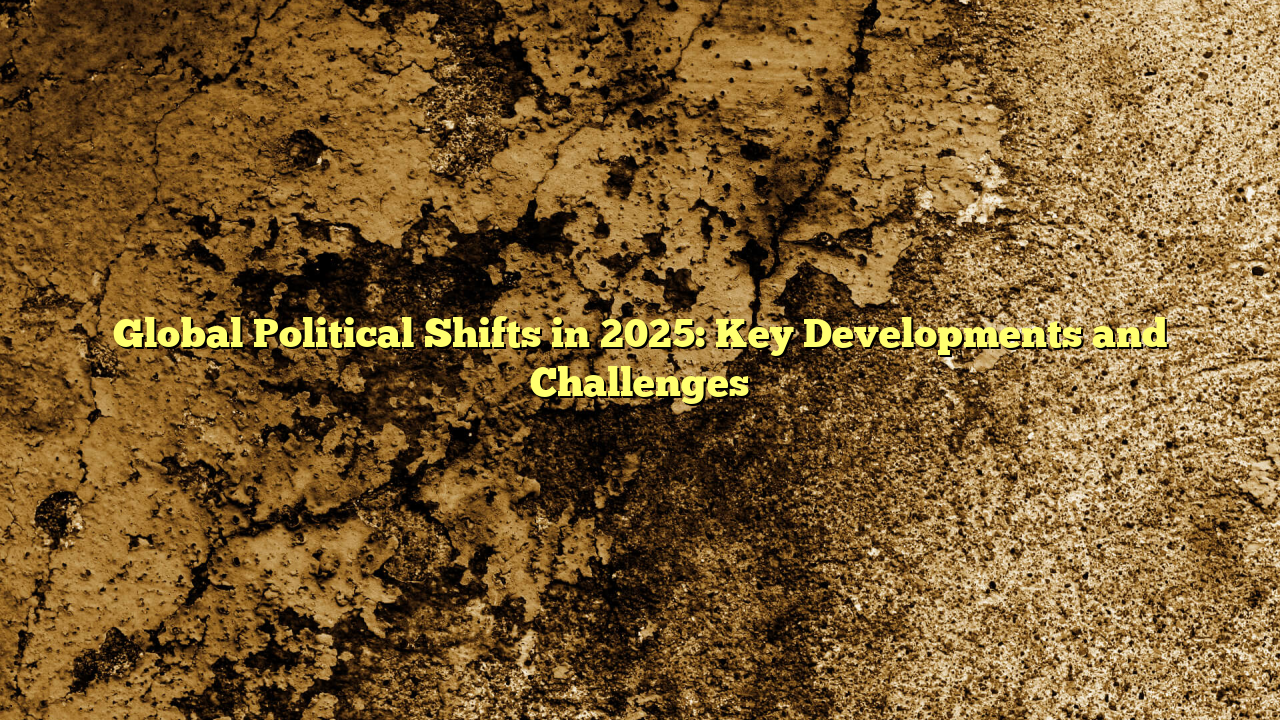The political landscape in 2025 is undergoing significant transformations, with major elections, geopolitical tensions, and policy changes shaping the future of global governance. From the United States’ high-stakes presidential race to intensifying conflicts in Eastern Europe and the Middle East, political events are influencing international relations, economic policies, and security strategies. This article explores some of the most pressing political news and trends shaping the world in 2025.
The U.S. Presidential Election: A Pivotal Moment
The 2025 U.S. presidential election is at the center of global political discussions. With the nation deeply divided on key issues such as healthcare, immigration, and foreign policy, the election outcome is expected to have widespread implications for both domestic and international affairs.
The Democratic and Republican candidates are presenting contrasting visions for the country. While the current administration has focused on economic recovery, climate change policies, and strengthening alliances with global partners, opposition candidates are pushing for stronger border security, tax reforms, and a shift in foreign policy priorities. The influence of independent candidates has also grown, reflecting public dissatisfaction with the two-party system.
Voter turnout, especially among younger demographics, will play a crucial role in determining the next U.S. president. With debates intensifying over economic inequality, social justice, and the role of government, this election is set to be one of the most consequential in recent history.
Europe’s Political Landscape: Nationalism vs. Unity
In Europe, the rise of nationalist movements and economic uncertainty is reshaping the continent’s political structure. slot deposit 1000 qris are experiencing a shift toward right-wing policies, with leaders advocating for stricter immigration controls, economic protectionism, and national sovereignty over EU regulations.
Germany and France, two of the European Union’s most influential members, are facing leadership transitions that could impact EU policies on trade, energy, and defense. Meanwhile, the United Kingdom continues to navigate the post-Brexit economic landscape, balancing trade negotiations with both European and global partners.
The ongoing conflict in Ukraine remains a major concern, with NATO and EU countries increasing their military and financial support for Kyiv. As tensions with Russia persist, European nations are reassessing their defense strategies and energy independence to reduce reliance on Russian resources.
China’s Growing Influence and U.S.-China Relations
China’s global presence continues to expand, with its economic and diplomatic strategies challenging Western influence. The country’s Belt and Road Initiative (BRI) has strengthened its ties with Asia, Africa, and Latin America, positioning China as a dominant force in global trade and infrastructure development.
However, tensions between China and the United States remain high, particularly in the areas of trade, technology, and military strategy. The South China Sea and Taiwan are major flashpoints, with both nations increasing their military presence in the Indo-Pacific region. The U.S. has maintained trade restrictions on Chinese technology companies, citing national security concerns, while China continues to push for economic self-reliance and innovation in artificial intelligence and semiconductor production.
Despite these tensions, diplomatic negotiations continue, with both sides recognizing the need for cooperation in global issues such as climate change and cybersecurity. However, the power struggle between these two nations is expected to remain a defining feature of international relations in the coming years.
Middle East: Shifting Alliances and Security Challenges
The Middle East remains a volatile region, with shifting alliances and ongoing conflicts influencing global politics. Iran’s nuclear ambitions continue to raise concerns among Western nations and neighboring countries, prompting renewed diplomatic efforts to prevent nuclear proliferation.
Saudi Arabia and the United Arab Emirates (UAE) are expanding their economic influence, investing heavily in technology, renewable energy, and tourism to diversify their economies beyond oil. Meanwhile, Israel’s relations with its Arab neighbors have improved through diplomatic agreements, but tensions with Palestine remain a major source of conflict.
The situation in Syria and Yemen also continues to draw international attention, with efforts to establish long-term peace agreements facing significant obstacles. The role of global powers in Middle Eastern affairs, including the involvement of Russia, the U.S., and China, further complicates the region’s geopolitical dynamics.
Climate Policies and Global Cooperation
Climate change remains a central issue in political discussions worldwide. Governments are under increasing pressure to implement policies that address rising global temperatures, extreme weather events, and carbon emissions.
International climate summits have brought world leaders together to discuss commitments to renewable energy, emission reductions, and environmental sustainability. However, divisions persist between developed and developing nations regarding financial support and technological assistance for green energy transitions.
In the corporate sector, companies are investing in sustainability initiatives, with industries such as electric vehicles and solar energy receiving significant government support. As countries balance economic growth with environmental responsibility, the effectiveness of climate policies will be a key factor in political decision-making moving forward.
Conclusion
The political landscape in 2025 is marked by significant challenges and transformations. From the U.S. presidential election to geopolitical tensions in Europe, Asia, and the Middle East, global politics are shaping the future of international relations and economic policies.
As governments and leaders navigate these complex issues, the importance of diplomacy, strategic policymaking, and global cooperation remains crucial. In an era of rapid change, political decisions made today will have lasting impacts on the stability and development of nations worldwide.
Global Political Shifts in 2025: Key Developments and Challenges



